初三上unit6 学提纲
7九年级英语上册第6单元《课程纲要》
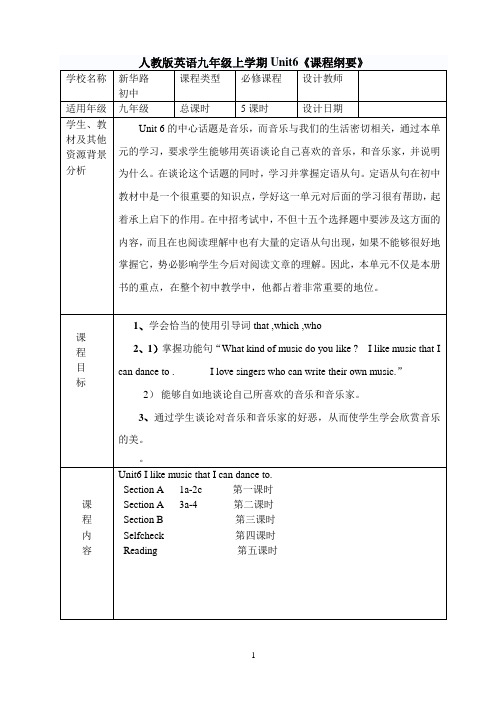
程目Biblioteka 标1、学会恰当的使用引导词that ,which ,who
2、1)掌握功能句“What kind of music do you like ? I like music that I can dance to . I love singers who can write their own music.”
2)能够自如地谈论自己所喜欢的音乐和音乐家。
3、通过学生谈论对音乐和音乐家的好恶,从而使学生学会欣赏音乐的美。
。
课
程
内
容
Unit6 I like music that I can dance to.
Section A 1a-2c第一课时
Section A 3a-4第二课时
Section B第三课时
Selfcheck第四课时
Reading第五课时
课
程
实
施
教法学法
1、教法:采取“任务型”教学法。教师根据本节课内容,安排合适的任务,让学生在完成任务的过程中达到本节课所拟定的目标。
2、学法:任务型。让学生通过完成课前找资料、上课积极参与、讨论,课后进行巩固和迁移等任务,来达到拟定的目标。
采用任务型教学法的根据:
初中英语新课程理念中说,使用“任务型”的教学,能让学习者在实施任务的过程中有更多的机会去接触可理解的语言输入,有更多的机会以口头或笔头的形式去进行语言交际,由此产生更多的语言互动或磋商性的活动,最终将促进他们更好更快地学习语言。四、教学环节的设计。
有
效
性
评
价
学生英语学习过程的评价
⒈利用课堂学生自评、互评、和教师评价,及时反馈学习信息。
⒉利用信息交流平台针对学生的学习情况、特性与家长定期进行交流。
九年级Unit6知识点整理
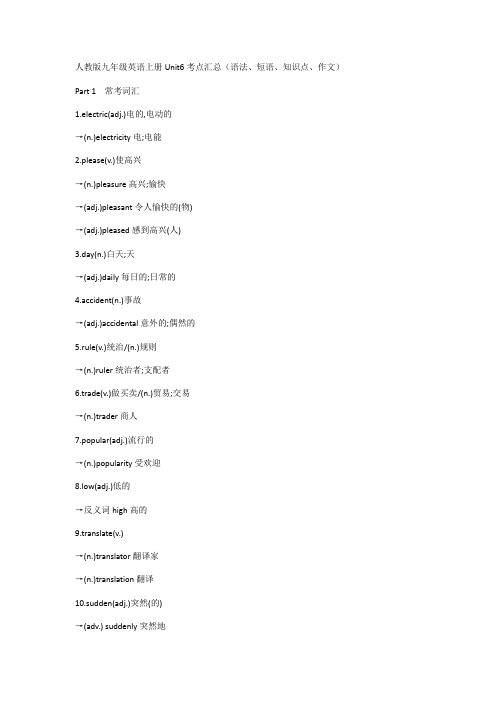
Section A
1.be invented (by sb.)被(某人)发明
2.shoes with special heels具有特殊跟的鞋
3. run on electricity靠电力驱动
4. change the world改变世界
5.It's my pleasure.
= My pleasure.我的荣幸
10.in our daily lives在我们的日常生活中
in my daily life
11.by accident=by chance偶然地,意外地
12.spread sth. to sp.传播…到某地
spread to other countries传播到其他国家
13.drinking water饮用水
人教版九年级英语上册Unit6考点汇总(语法、短语、知识点、作文)
Part 1常考词汇
1.electric(adj.)电的,电动的
→(n.)electricity电;电能
2.please(v.)使高兴
→(n.)pleasure高兴;愉快
→(adj.)pleasant令人愉快的(物)
→(adj.)pleased感到高兴(人)
at the end of this week
12
ask sb. (not) to do sth.要求某人(不)做某事
sb. be asked (not) to do sth.某人被要求(不)做某事
13
stop sb. (from) doing sth.
= prevent sb. (from) doing sth.
05
by mistake错误地,无意中
鲁教版初三上第六单元复习提纲初三上六单元复习太好用了,重要短语及句子unit6-sentences
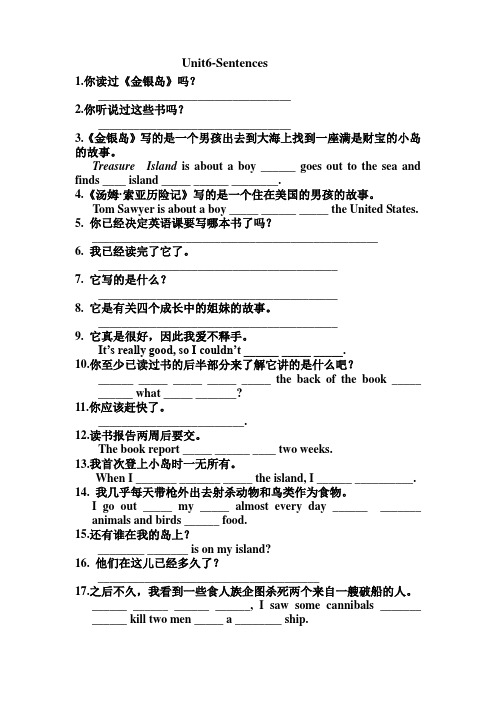
1.你读过《金银岛》吗?_________________________________2.你听说过这些书吗?_________________________________3.《金银岛》写的是一个男孩出去到大海上找到一座满是财宝的小岛的故事。
Treasure Island is about a boy ______ goes out to the sea and finds ____ island _____ ______ ________.4.《汤姆·索亚历险记》写的是一个住在美国的男孩的故事。
Tom Sawyer is about a boy _____ ______ _____ the United States.5. 你已经决定英语课要写哪本书了吗?_________________________________________________6. 我已经读完了它了。
_________________________________________7. 它写的是什么?_________________________________________8. 它是有关四个成长中的姐妹的故事。
_________________________________________9. 它真是很好,因此我爱不释手。
It’s really good, so I couldn’t ______ _____ _____.10.你至少已读过书的后半部分来了解它讲的是什么吧?______ _____ _____ _____ _____ the back of the book _____ ______ what _____ _______?11.你应该赶快了。
_________________________.12.读书报告两周后要交。
The book report _____ ______ ____ two weeks.13.我首次登上小岛时一无所有。
人教英语九年级上unit6知识点
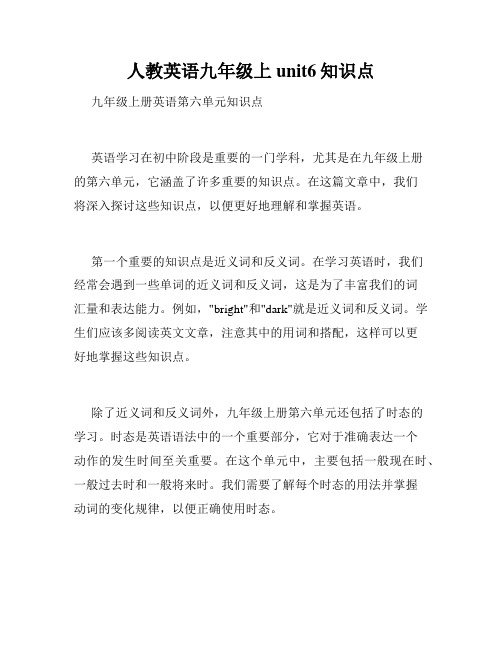
人教英语九年级上unit6知识点九年级上册英语第六单元知识点英语学习在初中阶段是重要的一门学科,尤其是在九年级上册的第六单元,它涵盖了许多重要的知识点。
在这篇文章中,我们将深入探讨这些知识点,以便更好地理解和掌握英语。
第一个重要的知识点是近义词和反义词。
在学习英语时,我们经常会遇到一些单词的近义词和反义词,这是为了丰富我们的词汇量和表达能力。
例如,"bright"和"dark"就是近义词和反义词。
学生们应该多阅读英文文章,注意其中的用词和搭配,这样可以更好地掌握这些知识点。
除了近义词和反义词外,九年级上册第六单元还包括了时态的学习。
时态是英语语法中的一个重要部分,它对于准确表达一个动作的发生时间至关重要。
在这个单元中,主要包括一般现在时、一般过去时和一般将来时。
我们需要了解每个时态的用法并掌握动词的变化规律,以便正确使用时态。
接下来是动词的被动语态。
动词的被动语态用于强调动作的承受者,而不是执行者。
在被动语态中,主语变为动作的承受者,而动词则用被动形式。
例如,“The letter was written by Tom”中的"was written"就是被动语态。
对于九年级的学生来说,掌握被动语态有助于提高写作和口语表达能力。
此外,九年级上册第六单元还包括了名词性从句的学习。
名词性从句用来作为主语、宾语或表语,并且可以替代一个名词或名词短语。
通过学习名词性从句,学生们可以更好地组织语言,表达自己的观点和思想。
最后一个重要的知识点是情态动词。
情态动词是用于表示说话人的态度、感情和可能性的动词。
常见的情态动词有can、may、must等。
情态动词在句子中一般需要和动词原形连用。
通过学习情态动词,学生们可以更好地掌握语言的灵活运用。
通过对九年级上册英语第六单元知识点的深入探讨,我们可以发现,这些知识点对于学生们的英语学习至关重要。
掌握这些知识点可以帮助学生们更好地理解和运用英语,并提高他们的写作和口语表达能力。
人教版新目标九年级英语上册unit6复习提纲

人教版新目标九年级英语上册unit6复习提纲ehere.在否定或疑问句中,用that连接Thereisnodoubtthatwewillwinthegame.atalowprice以很低的价格(价格的高低用high,low修饰)translate…into…把…翻译成PleasetranslatethissentenceintoEnglish.lock动词锁上,锁住Thedoorislocked.名词,锁Openthelock.打开锁allofasudden=suddenly突然Theearthquakehappenedallofasudden. bymistake错误地,无意中Itookyourumbrellabymistake.我误拿了你的雨伞。
intheend=atlast=finally最后attheendof在…的末尾change…into..把…变成much-loved备受喜爱的over=morethan超过onahardfloor在硬的地板上beaskedtodosth被要求做某事intheotherteam’sbasket在另一个队伍的篮子里onthesameteam在同一个队伍里atthesameteam在同一个队伍里thecompetingteam竞争队伍seesbdoingsthdivide…into..被…划分成Theteacherdividedthewholeclassinto4groups. bedividedinto被划分成Thecakewasdividedinto4piecesbyhim.divideup分配Wedividedupthemoneyequally.我们平均分配了前divide…from…把…与…分开TheEnglishChanneldividesEnglandfromFrance. stop…fromdoingsth阻止…做某事Wemuststophimfromplayingcomputergames.stoptodosth停下来去做另一件事stopdoingsth停止做某事can’tstopdoingsth=can’thelpdoingsth忍不住做某事,情不自禁做某事dreamofdoingsth梦想做某事Hedreamsofbecomingascientist.他梦想成为一名科学家。
人教版九年级上Unit 6复习提纲

Unit 6 When was it invented?一.重点单词1. music(n)---musical(adj)音乐的;有音乐天赋的---musician(n(音乐家2. custom(n)---customer(n)顾客;客户3. hero(n)---heroes(pl.)英雄;男主角4. Canada(n)---Canadian(adj/n)加拿大人(的);加拿大的5. please(inter/v)---pleasure(n)高兴;愉快---pleased (adj)满意的6. smell(v/n)---smelt/smelled(过去式/过去分词)发出...气味;闻到7. translate(v)---translation(n)翻译;译文---translator (n)(尤指专职)翻译;译员;翻译家8. near(prep/adj)---nearly(adv)几乎9. sudden(adj)---suddenly(adv)突然;忽然二.重点短语Section A1. by accident 偶然的;意外的2. take place 发生;出现3. without doubt 毫无疑问;的确4. all of a sudden 突然;猛地5. be used for (doing sth.)=be used to (do sth.) 被用来做……6. It is said that…据说7. fall into 落入;掉入8. It is believed that 人们认为9. bring to 带到;带入10. less than 少于;不到more than 多于11. know about 了解12. the nature of tea 茶的本质13. at a low price 以很低的价格14. have a point 有道理15. the style of ……的样式16. in our daily life 在我们的日常生活中17. some time 一段时间18. the saint of tea 茶圣19. in the 19th century 在19世纪20. run on electricity 靠电力驱动21. change the world 改变世界Section B1. by mistake 错误地;无意中2. divide…into把……分开3. look up to 钦佩;仰慕4. in the end = finally = at last最终;最后5. dream of 梦想;向往;渴望6. achieve one’s dream= realize one’s dream= make one’s dream come true实现某人的梦想7. decide on 决定;选定8. at the same time 同时9. stop…from doing sth.阻止……干某事10. the number of ……的数量11. encourage sb. to do sth. 鼓励某人做某事12. not only…but also…不但……而且13. such a great invention 如此伟大的一项发明14. think of/ about 想;考虑15. come up with 想出16. the popularity of………的普及17.translate…into…把……翻译成……18. a cook called 一个叫……的厨师19. the Olympics 奥林匹克运动会20. more and more 越来越……21. take notes 记笔记22. lead to 导致;导向23. teach sb. to do sth. 教某人做某事24. need to do sth. 需要做某事三.重点句子Section A1. ---When was the zipper invented?拉链是什么时候被发明的?---It was invented in 1893.是在1893年被发明的。
九年级英语unit6提纲
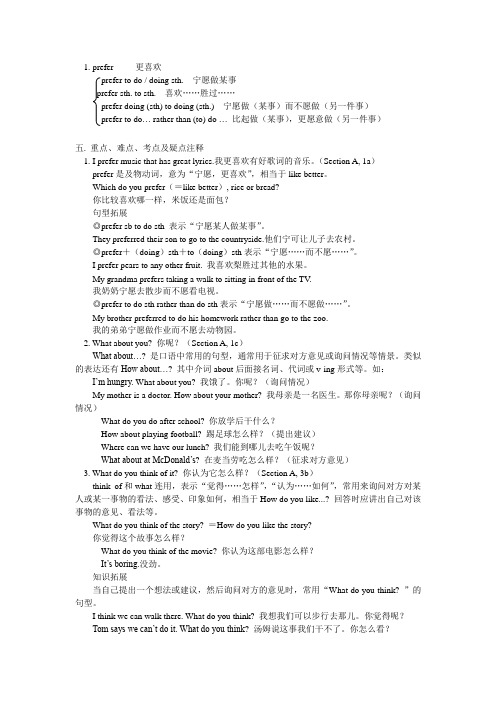
1. prefer 更喜欢prefer to do / doing sth. 宁愿做某事prefer sth. to sth. 喜欢……胜过……prefer doing (sth) to doing (sth.) 宁愿做(某事)而不愿做(另一件事)prefer to do… rather than (to) do …比起做(某事),更愿意做(另一件事)五. 重点、难点、考点及疑点注释1. I prefer music that has great lyrics.我更喜欢有好歌词的音乐。
(Section A, 1a)prefer是及物动词,意为“宁愿,更喜欢”,相当于like better。
Which do you prefer(=like better), rice or bread?你比较喜欢哪一样,米饭还是面包?句型拓展◎prefer sb to do sth 表示“宁愿某人做某事”。
They preferred their son to go to the countryside.他们宁可让儿子去农村。
◎prefer+(doing)sth+to(doing)sth表示“宁愿……而不愿……”。
I prefer pears to any other fruit. 我喜欢梨胜过其他的水果。
My grandma prefers taking a walk to sitting in front of the TV.我奶奶宁愿去散步而不愿看电视。
◎prefer to do sth rather than do sth表示“宁愿做……而不愿做……”。
My brother preferred to do his homework rather than go to the zoo.我的弟弟宁愿做作业而不愿去动物园。
2. What about you? 你呢?(Section A, 1c)What about…? 是口语中常用的句型,通常用于征求对方意见或询问情况等情景。
苏教初三英语Unit6知识概要

苏教版初三英语Unit6知识概要————————————————————————————————作者:————————————————————————————————日期:九上Unit6一、重点单词1.名词:chat show访谈节目game show游戏表演,竞赛节目dialogue对话fan迷,狂热爱好者music video(=MV)音乐视频text message短信,短消息director导演animal-lover喜欢动物的人waste浪费gun枪2.动词:cover报道,电视报道direct导演;指导record录制,;录像,录音3.形容词:done完毕,结束real-life真实生活的up-to-date最新的;现代的coming即将来临的Asian亚洲(人)的wealthy 富有的latest最新的,最近的silly傻的;愚蠢的4.副词:live在现场直播,在实况直播5.连词:unless除非6.情态动词:might或许,可能二、常见词组1.get bored with doing sth.厌烦做某事2.learn a lot about nature了解很多关于自然的知识3.win a big prize赢得一个大奖4.with up-to-date information有最新的消息5.cover different sports涵盖不同的体育运动6. a number of interviews许多采访7.will be covered live将被现场直播8.vote online for在网上给……投票9.send text messages to…发送短信至……10.win two free concert tickets赢得两张免费的音乐会门票11.be directed by…由……导演12.a wealthy doctor一个富有的医生13.be full of充满……14.get scared easily很容易害怕 viewing habits看电视的习惯16.a waste of time浪费时间17.call the police报警18.stop them from leaving阻止他们离开三、经典句型1.否定疑问句例:Eddie, aren’t you get bored with staying at home all day.埃迪,你整天呆在家里不会感觉无聊吗?2.There + be + 名词+现在分词有……正在做……例:There are always famous people on these shows talking about their lives.总有名人在这些节目上谈论他们的生活。
初三英语上册unit 6单元复习提纲

初三英语unit 6复习提纲一、本单元的重点如下1、重点单词/kəˈlekt/ /pɛə/ /skeɪt//sɪns/ /reɪz/ /ˈsevərəl//stæmp/ /kaɪt/ /ˈenɪwʌn//stɔ:/ /keɪk/ /ˈkɔmən// kɔɪn/ / bɪ:n/ / ˈraɪtə//ˈkæpɪtl/ /ˌjʊərəˈpi:ən/ /ˈrʌʃən//ɔˈstreljən/ /ˈθaʊzənd/ /ˈfɔrɪnə//kwaɪt/ /ˈsə:tn/ /mɪs/2、重点词组为慈善机构筹款第一(二)个开始(到校)的人送某物给某人事实上花光用完在我9岁/(12岁)生日那天顺便完成某事在冬天期间…的首都一千多年以前开始做某事一个有着悠久历史的古国奥运会3、重点句型1)、本单元主要讲的是一个新的时态,即_________________,其表达方式是_______________.例如How long _______ he _____________________(收藏邮票)?He _______________(花光) his money __________________________(收藏古币)。
I _________(live) here since I ______(come) to China.He __________(ride) his bicycle for half an hour.They _______________(not do) their homework yet.但是现在完成时要和一般过去时态区分开来,一般过去时态讲的是过去发生的动作,而现在完成时是指到现在为止已经完成的动作,区分下列句子He ________(sleep) since last night.They ________(study) for the test for two days.Tom _________(run) for 15 minutes last Saturday.My father ________(fly) to HongKong 2 days ago.Yesterday my sister ________(ride) a bike for 2 hours.How long ______ you _______(play) computer games last night?How long ________ he ________(sit0 there? For 20 minutes.He ________(become) a lawyer 2 years ago.He ____________(be) a teacher since 2 years ago.We _________(receive) 3 letters just now.When _________he ________(start) collecting shells?2)、我的爱好是弹吉他,__________________________和___________________________3)、表达“越…..越……”用________________________我越多的了解中国历史,就越喜欢在中国居住。
人教版新目标九年级全册英语 Unit 6 单元语法知识点考点复习提纲
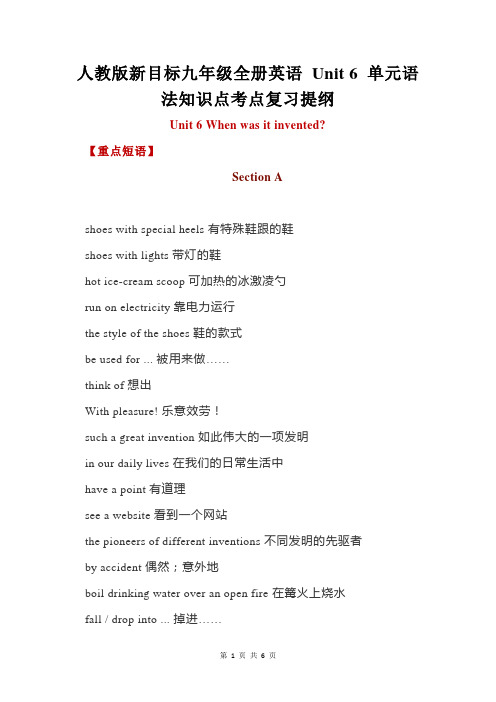
人教版新目标九年级全册英语Unit 6 单元语法知识点考点复习提纲Unit 6 When was it invented?【重点短语】Section Ashoes with special heels 有特殊鞋跟的鞋shoes with lights 带灯的鞋hot ice-cream scoop 可加热的冰激凌勺run on electricity 靠电力运行the style of the shoes 鞋的款式be used for ... 被用来做……think of 想出With pleasure! 乐意效劳!such a great invention 如此伟大的一项发明in our daily lives 在我们的日常生活中have a point 有道理see a website 看到一个网站the pioneers of different inventions 不同发明的先驱者by accident 偶然;意外地boil drinking water over an open fire 在篝火上烧水fall / drop into ... 掉进……produce a nice smell 产生一种香味the saint of tea 茶圣in less than 100 years 在不到一百年的时间里national drink 国饮take place 发生;出现tea culture 茶文化without doubt 毫无疑问;的确understand the nature of tea 了解茶的本质sell ... at a low price 低价卖……translate ... into ... 把……翻译成……all of a sudden 突然;猛地ring the bell 按门铃musical notes 乐符Section Bpotato chips 炸薯条;炸土豆片by mistake 错误地;无意中in the end 最后put lots of salt on ... 在……上面撒很多盐a much-loved and active sport 一种备受欢迎而且剧烈的运动more than 超过;多于in history 历史上a college teacher 一位大学老师divide ... into 把……分开get the ball in the other team’s basket把球投进对方篮筐at the same time 同时stop ... from doing ... 阻止……做……dream of 梦想;幻想;向往not only ... but also ... 不但……而且……the number of ... ……的数量look up to these basketball heroes 钦佩 / 仰慕这些篮球英雄encourage sb. to do sth. 鼓励某人做某事achieve their dreams 实现他们的梦想come up with 提出;想出lead to 导致【考点详解】1. invent v. 发明inventor n. 发明家invention n. 发明2. be used for doing 用来做…(是被动语态)(这个短语的考点有两点,一是used for的意思,二是for后面用动名词)Pens are used for writing. 笔是用来写的。
新目标九年级上u6知识点总结
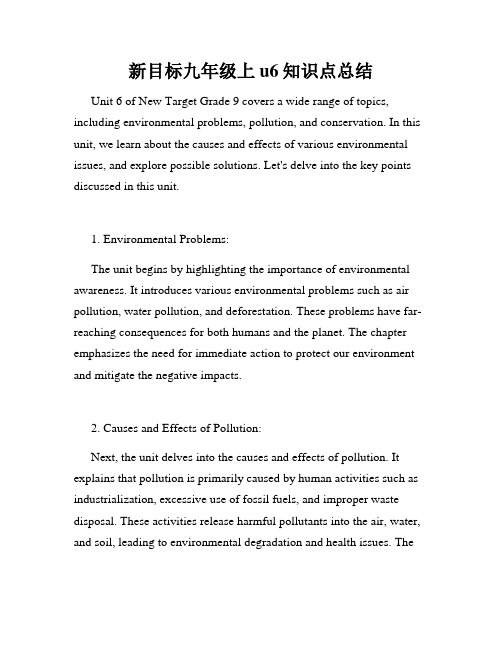
新目标九年级上u6知识点总结Unit 6 of New Target Grade 9 covers a wide range of topics, including environmental problems, pollution, and conservation. In this unit, we learn about the causes and effects of various environmental issues, and explore possible solutions. Let's delve into the key points discussed in this unit.1. Environmental Problems:The unit begins by highlighting the importance of environmental awareness. It introduces various environmental problems such as air pollution, water pollution, and deforestation. These problems have far-reaching consequences for both humans and the planet. The chapter emphasizes the need for immediate action to protect our environment and mitigate the negative impacts.2. Causes and Effects of Pollution:Next, the unit delves into the causes and effects of pollution. It explains that pollution is primarily caused by human activities such as industrialization, excessive use of fossil fuels, and improper waste disposal. These activities release harmful pollutants into the air, water, and soil, leading to environmental degradation and health issues. Thechapter reinforces how pollution affects not only our ecosystems but also our own well-being.3. Climate Change and Global Warming:The unit moves on to discuss climate change and global warming. It explains the greenhouse effect and how human activities intensify this natural phenomenon. The chapter explores the consequences of global warming, including rising sea levels, extreme weather events, and the endangerment of various ecosystems. It stresses the urgency of reducing carbon emissions and adopting sustainable practices to combat climate change.4. Conservation and Sustainable Development:In response to the aforementioned challenges, the unit introduces the concept of conservation and sustainable development. It highlights the importance of preserving biodiversity, protecting endangered species, and promoting renewable energy sources. The chapter also emphasizes the role of individuals, communities, and governments in implementing sustainable practices to ensure a better future.5. Environmental Organizations and Movements:Unit 6 also covers prominent environmental organizations and movements. Students learn about influential figures like Greta Thunberg and their efforts in raising awareness and advocating for environmental action. The chapter encourages students to actively participate in such movements and make a difference in their own communities.6. Solutions and Practical Actions:The final part of the unit focuses on practical actions that can be taken to address environmental issues. It suggests reducing, reusing, and recycling as effective ways to minimize waste and conserve resources. Additionally, it explores the importance of sustainable transportation, energy conservation, and responsible consumption. Students are encouraged to adopt these practices in their daily lives.In conclusion, Unit 6 of New Target Grade 9 provides a comprehensive overview of environmental problems, pollution, and conservation. By understanding the causes and effects of pollution, the importance of climate change mitigation, the significance of conservation efforts, and the implementation of practical solutions, students are equipped with the knowledge to become responsible global citizens. It is essential for young minds to grasp these concepts andactively contribute to the betterment of our environment and the world at large.。
新目标九年级英语unit 6 导学提纲 3

Unit 6 When was it invented?Section B 2a-self-check 第三课时班级姓名小组________【学习目标】1.Master the key words: divide; popularity; look up to; hero; professional2.Train students’ reading and writing skills by talking about the history of basketball.3.To train students’ ability to use mind-mapping to remember information.【重点难点】重点:Read the article to identify main idea, to understand words in the text and catch the special information.难点:Be able to talk about the history of inventions using passive voice.【导学流程】一、了解感知Ⅰ. 拼读记忆单词1. n.加拿大/人的2. 分开;分散(短语:)3. purpose n.4. basket /ba:skit/ n.5. the Olympics6. look up to =7. hero n.8.BerlinNBA (National Basketball Association) 国家篮球协.会(美国职业篮球联赛)CBA (China Basketball Association) 中国篮球协会(中国职业篮球联Ⅱ. 重点短语, 在文章中划出做好笔记。
1. a much-loved and active sport一个深受喜爱并且积极的运动2. divide …into把…分开3. work together配合,合作4. at the same time同时5.stop / prevent sb from doing sth 阻止某人做某事6. dream of doing sth梦想做某事7. look up to钦佩,仰慕8. the professional basketball groups职业篮球机构二、深入学习Ⅰ. 你知道这个人吗?快速阅读课文,找出其事迹。
人教版九年级全册英语第6单元知识点复习提纲
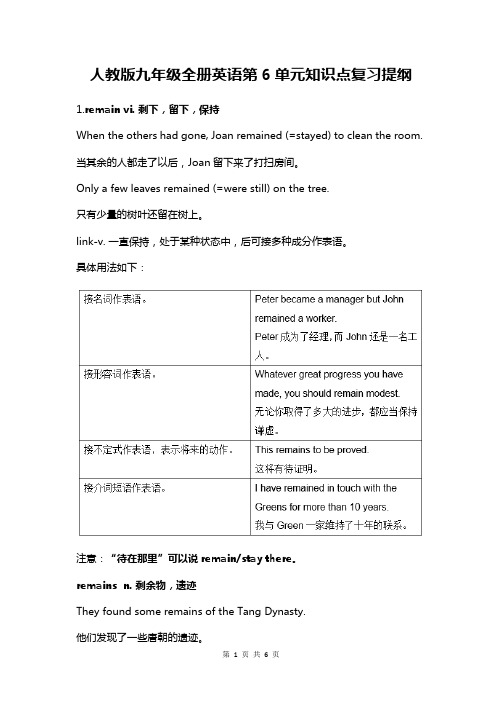
人教版九年级全册英语第6单元知识点复习提纲1.remain vi. 剩下,留下,保持When the others had gone, Joan remained (=stayed) to clean the room. 当其余的人都走了以后,Joan留下来了打扫房间。
Only a few leaves remained (=were still) on the tree.只有少量的树叶还留在树上。
link-v. 一直保持,处于某种状态中,后可接多种成分作表语。
具体用法如下:注意:“待在那里”可以说remain/stay there。
remains n. 剩余物,遗迹They found some remains of the Tang Dynasty.他们发现了一些唐朝的遗迹。
remaining adj. 剩余的,常作前置定语;left(leave的过去分词)也可以表示“剩余的”,但只能作后置定语。
They will meet next month to work out remaining differences.他们将在下个月会面,以解决余下的分歧。
There are only 5 books left.这儿只剩了五本书。
2.stay的常见用法stay n. 停留;逗留(期间)I enjoyed my stay in Hong Kong.我在香港逗留期间很开心。
stay vt./vi. 停留;停止I stayed at my cousin's house for three nights.我在我表弟家住了三个晚上。
stay link-v. 继续处于某种状态I can't stay awake any longer.我再也不能保持清醒了。
3.not only…but also...1) not only…but also... 应连接两个相对称的并列成分。
例句:I not only play tennis but also practice shooting.(连接两个谓语动词)我不仅打网球,也练习射击。
人教版新目标九年级英语上册unit6复习提纲

人教版新目标九年级英语上册unit6复习提纲unit6henasitinvented?changethestyleoftheshoes改变鞋子的风格instyle时尚的,时髦的outofstyle过时的aninvention一项发明aninventor一个发明家ithpleasure我很乐意,相当于allright,用于答应别人的请求,在帮助别人之前使用It’sapleasure.=It’sypleasure.=ypleasure.我的荣幸,不客气,用于帮助别人之后回答别人的感谢。
suchagreatinvention如此伟大的发明inourdailylives在我们的日常生活中seetodosth似乎要做某事haveapoint有道理do,does,did在动词原形前,起强调作用thepioneersofdifferentinventions不同发明的先驱asn’tusedidely没有被广泛使勇ention动词,提到,说到,后面可以接名词、代词、doing、从句hydidyouentionit?/Hedidn’tentionhisbrothertoe.Ientionedplayingbasetballjustnoandheagreed.list动词,列举Listtenofyourfavoritesongs.列出你最喜欢的十首歌曲。
belisted被列举名词,清单,列表shoppinglist购物清单aealist制作清单pleasant形容词,令人愉快的,常作定语,修饰物pleased形容词,使人感到高兴,满意,主语为人bepleasedtodosth很高兴做某事bepleasedith对…满意pleasing形容词,常作表语Thetripispleasing.byaccident意外地Ihurtylegbyaccident.偶然地=bychanceIfoundypursebyaccident/bychanceinthelibrar y.itissaidthat+句子据说Itissaidthatheisthebeststudentinourschool.itisreportedthat+句子据报道Itisreportedthatitillraintoorro.Itisbelievedthat据认为,人们认为Itisnonthat众所周知achineserulercalledShenNong一个叫做神农的中国统治者driningater饮用水overanopenfire在室外的火上fallinto落入falldon 倒塌,摔倒falloff从…摔倒falldonfro=falloff从…摔倒fallbehind落后fallasleep睡着soetie一段时间soeties几次,几倍soeties有时候soetie将来某时候oneof+名词复数做主语,谓语从此用三单,因为主语是oneinlessthan100years在不到100年的时间里thepopularityoftea茶的普及anaccidentalinvention一次偶然的发明taeplace&happenhappen表示偶然的发生,不可预见taeplace表示历史事件,会议的发生和变化的发生,含有事先预料、计划之意Greatchangeshavetaenplaceinyhoeton.inthe19thcentury在19世纪nationaldrin国饮thefinesttealeaves最好的茶叶not…until…直到…才…afethousandyearslater几千年后teatrade茶的贸易ithoutdoubt毫无疑问doubt不管是名词还是动词,在肯定句中,后面用hether/if连接Idoubthether/ifheillehere.在否定或疑问句中,用that连接Thereisnodoubtthateillinthegae.ataloprice以很低的价格translate…into…把…翻译成PleasetranslatethissentenceintoEnglish.loc动词锁上,锁住Thedoorisloced.名词,锁opentheloc.打开锁allofasudden=suddenly突然Theearthquaehappenedallofasudden.byistae错误地,无意中Itooyourubrellabyistae.我误拿了你的雨伞。
人教九年级英语上册课件:Unit 6单元知识归纳(共14张PPT)
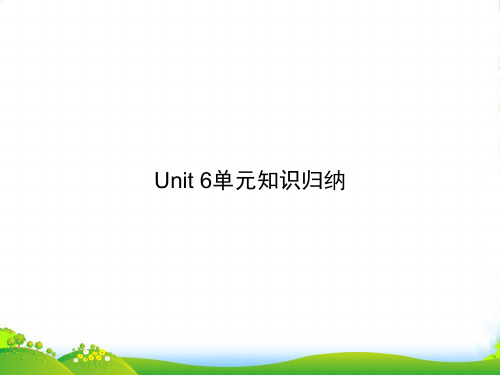
• Ⅰ.词形变换 • 1.please→(名词)pleasure • →(形容词)pleased/pleasant • 2.daily→(同义词)everyday • 3.nearly→(同义词)almost • 4.boil→(形容词)boiling/boiled • 5.national→(名词)nation
• 26.ring the bell 按铃 • 27.break the rule 违反规定 • 28.by mistake错误地;无意中 • 29.potato chips 薯片 • 30.make the customer happy 让顾客
高兴
• 31.in the end 最后;终于 • 32.a much-loved sport 一项备受喜爱
• 4.The zipper was invented by Whitcomb Judson.
• 拉链是由惠特科姆·贾德森发明的。
• 5.It is believed that tea was brought to Korea and Japan during the 6th and 7th centuries.
。
6、does not mean teaching people to kow what they do not know ; it means teachng them to behave as they do not b ehave. 教育不在于使人知其所未知,而在于按其所未行而行。2021年11月上午1时1分21.11.2401:01November 24, 2021
• 许多年轻人仰慕这些篮球英雄们,并且 想要变得像他们一样。
• 8.These stars encourage young people to work hard to achieve their dreams.
- 1、下载文档前请自行甄别文档内容的完整性,平台不提供额外的编辑、内容补充、找答案等附加服务。
- 2、"仅部分预览"的文档,不可在线预览部分如存在完整性等问题,可反馈申请退款(可完整预览的文档不适用该条件!)。
- 3、如文档侵犯您的权益,请联系客服反馈,我们会尽快为您处理(人工客服工作时间:9:00-18:30)。
朱吴二中初中英语学科导学提纲
课题:Unit 6 How long have you been collecting shells?
Section A (1a—2c)
课型:新授主备:审核:年级:初三时间:2008.11.25
一.学习目标Teaching aims and demands
1. 知识目标Knowledge goals掌握部分单词及短语的使用:collect,shell,
marathon,pair,skate,skating marathon,a pair of skates,since
2. 能力目标Ability goals提高使用现在完成进行时进行语言交流的能力
3. 情感目标Emotion goals学会用英语描述自己的喜好,快乐地进行合作学
习
二.学习过程Teaching and learning procedures
Step 1:Warming up-Free talk
Ask students to talk about something. (in pairs)
For example:A:When did you lose your wallet/have your hair cut?…
B:I lost my wallet/had my hair cut… yesterday.
Step 2. Revision-lead in
1. 交流预习情况,讨论解决预习中发现的问题。
(以小组为单位或师生相
互探讨)
自主探究:
A:划出新单词和词组,并试着读一读。
B:注意以下单词的词性及用法,并尝试做出后面的练习。
(1)collect v. 收集贝壳
collector n. 几个收藏家
(2)skate v. 去滑冰
n. 一双溜冰鞋
skater n. 许多溜冰者
(3)since conj.(连词)I have been collecting stamps
.(自我7岁起)prep.(介词)I have been living there
.(自8年以前)2.语言点导学:
(1)现在完成进行时:
构成:have/has been+现在分词
eg: I have been collecting shells for five years.
功能:表示从过去某一时间开始一直延续到现在的动作,并有可能持续下去。
现在完成时的句子中多用延续性动词,如:live, learn, study, work等;常与for two hours,since2006,all this morning, these few days等表示一段时间的状语连用。
注意:for+时间段eg: for 2 years
Since+时间点eg: since 4 days ago/2007/9 o’clock/I was te n.
(2)I have been skating for 5 hours.我已滑了5个小时的冰。
(现在仍在滑)
I skated for 4 hours.我滑了4个小时的冰。
(现在不滑了)
Step3:Presentation
1. Check the new words: collect, shell, marathon, pair, skate, since
2. Learn some phrases using pictures, such as skating marathon, the pair of skates,
in a skating marathon, talk to, for five years etc.
3. Talk about “When did you start class today?” “How long did you sleep last
night?”, and then discuss “How long have you been in class today?” using picture in 1a. Ask some st udents to answer the questions using “for, at, since”.
4. Pairwork: Ask and answer questions about the people in the picture 1a.
5. Listening Finish1b.
Step4:Activities (in groups)
Have a game to see which group is better. Finish 2a, 2b. Listen to fi nish √,and then listen again to answer the questions you hear. A t last show the listening content to students if necessary.
Step5:Checkpoint
1. Work in pairs (finish 2c)
Student A is the reporter. Student B is Alison. Role play the interview.
eg: A: How long have you been skating?
B: I’ve been skating since I was seven years old.
2.Ex.
(1)你什么时候有的第一双溜冰鞋?
When did you get your ?
(2)我哥哥自6个小时前一直在滑冰。
My brother has been six hours .
(3)我一直在为这家公司工作九年了。
I ______ ______ ______ for this company for nine years.
(4)你收集钱币多长时间了?
How long ______ you ______ ______coins?
(5)昨天玛丽滑了多长时间的冰?
How long Mary yesterday?
Step6:Practice and progress
1.根据要求转换下列句子。
(1)Tom has been skating for five hours.(改为否定句)
Tom ______ ______ ______for five hours.
(2)We played baskerball for two hours.(改为现在完成进行时)
We______ ______ ______ baskerball ______ ______ ______.
(3)We have been swimming for two hours.(对划线部分提问)
______ ______ ______ you been ______?
(4)I started skating when I was eleven years old.(对划线部分提问)
_______ ______ you ______skating?
2. Fill in the blanks with “for” or “since”
(1)They have been learning Chinese they came to China.
(2)She has been doing her homework two hours.
(3)He has been reading 9 o’clock.
(4)He has been living here 2001.
(5)---How long has Mary been swimming?
--- two hours ago.
当堂反馈小结:回想本课所学内容,你学到了哪些?你还有哪些疑问?。
